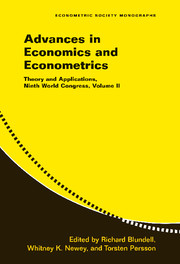Book contents
- Frontmatter
- Contents
- Contributors
- Introduction by the Editors
- Advances in Economics and Econometrics
- 1 Empirical Models of Auctions
- 2 Identification in Models of Oligopoly Entry
- 3 Empirical Models of Imperfect Competition: A Discussion
- 4 Recent Developments in the Economics of Price Discrimination
- 5 Bounded Rationality in Industrial Organization
- 6 Price Discrimination and Irrational Consumers: Discussion of Armstrong and Ellison
- 7 Behavioral Economics
- 8 Incentives and Self-Control
- 9 Discussion of “Behavioral Economics”
- 10 Dynamic Models for Policy Evaluation
- 11 Microeconometric Search-Matching Models and Matched Employer-Employee Data
- 12 Discussion of ‘Dynamic Models for Policy Evaluation’ and ‘Microeconometric Search-Matching Models and Matched Employer-Employee Data’
- 13 Field Experiments in Development Economics
- 14 Institutions and Development: A View from Below
- Index
- Titles in the series
3 - Empirical Models of Imperfect Competition: A Discussion
Published online by Cambridge University Press: 05 January 2013
- Frontmatter
- Contents
- Contributors
- Introduction by the Editors
- Advances in Economics and Econometrics
- 1 Empirical Models of Auctions
- 2 Identification in Models of Oligopoly Entry
- 3 Empirical Models of Imperfect Competition: A Discussion
- 4 Recent Developments in the Economics of Price Discrimination
- 5 Bounded Rationality in Industrial Organization
- 6 Price Discrimination and Irrational Consumers: Discussion of Armstrong and Ellison
- 7 Behavioral Economics
- 8 Incentives and Self-Control
- 9 Discussion of “Behavioral Economics”
- 10 Dynamic Models for Policy Evaluation
- 11 Microeconometric Search-Matching Models and Matched Employer-Employee Data
- 12 Discussion of ‘Dynamic Models for Policy Evaluation’ and ‘Microeconometric Search-Matching Models and Matched Employer-Employee Data’
- 13 Field Experiments in Development Economics
- 14 Institutions and Development: A View from Below
- Index
- Titles in the series
Summary
INTRODUCTION
The field of Industrial Organization (IO) studies the behavior of firms and the interaction among them. In the last 25 years, IO studies have increasingly focused on single industries, using a combination of economic theory and statistics to analyze strategic interaction between firms. The focus on a particular industry allows the researcher to develop a model that takes into account the specific details of the industry. IO economists then use the model to derive comparative statics and test them in the data, and often estimate the structural parameters of the model using state-of-the-art econometric methods.
IO studies a broad array of decisions made by firms, starting from long-run decisions, such as those of entry into particular markets or those that relate to product design and development, medium-run decisions, such as contractual relationships and production, and short-run decisions, such as pricing and bidding in auctions. As each of these decisions is somewhat distinct from others in various aspects (the nature of the decision, the relevant policy questions, the typical data sets available to the empirical researcher, and so on), the literature of recent years can be classified according to which decision it analyzes.
Two issues of particular interest have been entry and exit decisions that determine market structure and price competition. These issues are the focus of the two excellent surveys by Athey and Haile, and Berry and Tamer.
- Type
- Chapter
- Information
- Advances in Economics and EconometricsTheory and Applications, Ninth World Congress, pp. 86 - 96Publisher: Cambridge University PressPrint publication year: 2006
- 3
- Cited by



